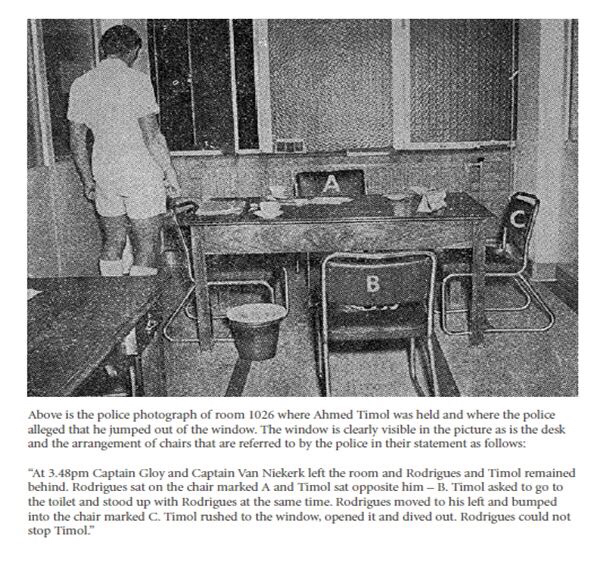Rodrigues will continue his testimony on Tuesday where he is expected to comment on the evidence he gave during the original inquest.
Two former police officers, Neville Els (82) and Joao Rodrigues (78), appeared before the inquest into Ahmed Timol’s death on Monday, saying they had heard of but never seen any torture used on anti-apartheid activists.
Joao Rodrigues, a tall man, smiled often at the Pretoria high court on Monday as the Timol inquest entered the second week of its second sitting. His testimony was highly anticipated: Rodrigues, a member of the Security Branch who pushed paperwork and administration, is the last known person to have seen Timol alive before the 29-year-old allegedly fell to his death from a 10th floor window at John Vorster Square (now known as Johannesburg central police station) in 1971.

During his testimony before Judge Billy Mothle, who will make the findings from the inquest, Rodriques admitted that members of the apartheid Security Branch encouraged him to lie in his initial statement on Timol’s death. It was the first time the apartheid policeman admitted there had been an attempt at a cover-up in the 46 years since Timol’s passing.
“Police officers pressurised me. I was advised on what to write in my statement which was not true,” he said.
“What I can recall is that General Gloy told me to write in my statement that there was a fight between myself and Timol [before his death].”
Rodrigues told the inquest on Monday, however, that he had “never touched” Timol and he declined to write the statement his seniors had allegedly wanted.
What he presented to the court was a repetition of the statement he made at the first inquest into Timol’s death in 1972. In his statement at that inquest, the former cop said that Timol had jumped to his death after he asked Rodrigues to accompany him to the bathroom.
At the time Rodrigues entered the office where Timol was held, two policemen, Captain JZ Van Niekerk and Captain JH Gloy, were inside with him. They had interrogated him.
After receiving word that more people had been detained, Van Niekerk and Gloy left Rodrigues alone with Timol to guard him, the inquest heard. It was then that Timol requested to go to the bathroom and moved swiftly to jump out of the window after Rodrigues accepted his request, the former apartheid policeman said in his testimony. Timol allegedly went to the window while Rodrigues was moving a chair that was blocking the path.
“I saw a movement from the corner of my right eye. I quickly looked up and I saw Timol moving,” Rodrigues testified.
“I tried my best. I moved as fast as possible, but I could not reach him.”
The Timol that the police officer described was fast and agile. He was in a healthy condition that allowed him to get up from his chair, move hurriedly to the window, and throw himself out to his death. Rodrigues said he did not appear injured or hurt in any way.
But last week the inquest heard from two different pathologists that it was not possible for Timol to stand up or jump from a window because he had been severely injured before the fall. His skull had been fractured on the left side of his head, and his jaw crushed.
While Rodrigues testified that Timol drank coffee before he leapt, his jaw injury meant he would have to drink with a straw, forensic pathologists said last week.
The warnings given
Judge Mothle warned Rodrigues on Monday that if at the end of the inquest he is found to be implicated in Timol’s death, he could face prosecution. Rodrigues did not appear before the Truth and Reconciliation Commission (TRC) and therefore does not have amnesty for any crimes he committed or was an accessory to during apartheid.
“At the end of this inquest, if I should find there was some role [you played] in the death of Mr Timol, then you risk facing prosecution,” Mothle said.
The judge gave Rodrigues this warning to ensure he fulfilled his Constitutional mandate. He did the same with Neville Els, a former apartheid policeman who was a warrant officer at the time Timol was arrested. Els drew sighs and some irritation from the Timol family as he continued to answer significant questions with just three words: “I cannot recall”.
Els said that he only became aware of torture methods used in the apartheid police force because of media reports at the time. He was based on the 9th floor of John Vorster Square where his worked from his office, but he could not recall seeing detainees injured or in distress at the time Timol was held. He also could not recall if any of the police used torture, and testified that he did not believe sleep deprivation was a form of torture unless a detainee was interrogated for four or five days with no sleep.
When asked if he had ever participated in cover-ups during apartheid, Els replied: “No”.
Rodrigues and Els’ denial of torture used by the apartheid police was a disappointment to Imtiaz Cajee, Timol’s nephew, who watched as the two men swore an oath to tell the truth prior to their testimonies. Cajee said he had woken up on Monday morning expecting some form of truth to emerge, but it was not the case. The smiling Rodrigues, he said, was “gleeful” and without any sense of sorrow.
“You see absolutely no remorse,” Cajee told the Mail & Guardian.
“We are always optimistic, because we totally believe in the truth. I’m disappointed that they both stick to their versions [from during apartheid].”
Cajee said the judge reminded the two policemen of their rights, “but they’ve made their decisions” and the inquest will have to make its findings.
Rodrigues will continue his testimony on Tuesday when he is expected to comment on the evidence he gave during the original inquest.